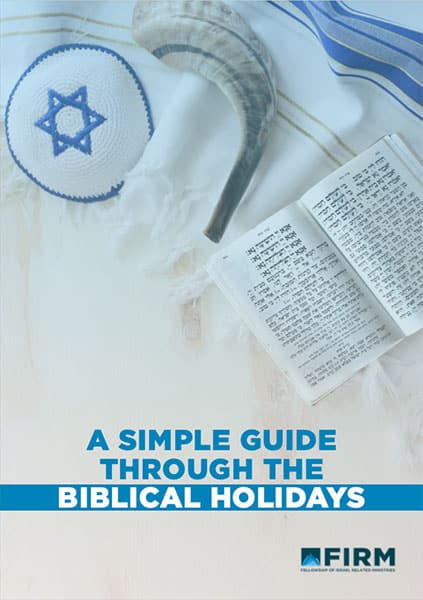Should Christians observe Jewish holidays?
In growing deeper with the Lord and in Bible study, there can be a question of whether Christians should observe Jewish holidays. A Messianic Jewish perspective can offer a unique lens. Through it, we can examine the relevance, benefits, and considerations of believers participating in Jewish holiday observances.
A Messianic Jewish Foundation for the Holidays
Messianic Judaism is a movement of Jewish people that embraces the Messiahship of Jesus (Yeshua in Hebrew). it is a continuance of Jewish identity through Jewish tradition, but primarily through Biblical Judaism, rather than through the rabbis.
Thus, through faith in Yeshua, this Jewish identity provides a foundation for exploring the Jewish holidays (also known as Biblical feasts) and gives them significance in a believer’s life.
The Significance of Jewish Holidays
Jewish holidays are not merely cultural commemorations but profound expressions of faith. They are rooted in biblical events that highlight God’s relationship with His people. Celebrating the holidays alongside the Jewish people can be a way of celebrating God’s faithfulness to them.
Celebrating the holidays also remembers God sustaining the Jewish people through many difficulties and keeping His promises throughout the millennia.
These observances serve as a constant reminder of God’s provisions, promises, and the fulfillment of prophecy. From Passover, which commemorates the Israelites’ liberation from Egyptian bondage, to Sukkot, which celebrates God’s provision during the wilderness journey, each festival is steeped in spiritual significance and historical depth.
Shared Heritage
The foundational texts of Christianity are deeply intertwined with Jewish history and scripture. Jesus, His disciples, and the first Christians were all Jews. They would have been intimately familiar with Jewish law and customs.
Observing Jewish holidays can offer Christians deeper insights into the life and teachings of Jesus. It will also enhance their understanding of the New Testament, which frequently references Jewish festivals and practices.
Participating in the Three Jewish Pilgrimage Festivals
Participating in Jewish holidays provides an opportunity for spiritual reflection and growth. For starters, consider the three pilgrimage festivals in the Jewish calendar.
First, Passover (Pesach) allows believers to contemplate the sacrificial Lamb of God. The holiday celebrations draw many parallels between the Exodus story and Jesus’ sacrifice for humanity’s redemption.
Then, the Feast of Weeks (Shavuot or Pentecost) celebrates the giving of the Torah (in the days of Moses) and the Holy Spirit (after Jesus’ ascension). This holiday highlights themes of revelation and empowerment.
Finally, Sukkot (Tabernacles) remembers the temporary dwellings of the Israelites in the wilderness, but for believers, we know that God came to dwell with us eternally.
Which Jewish holidays are most relevant for believers?
Jewish holidays hold various levels of relevance to the Christian faith, often reflecting shared biblical narratives and theological themes. Here’s a list of major Jewish holidays with their significance to Christianity:
-
Rosh Hashanah (Jewish New Year)
- Relevance: According to Jewish tradition, it marks the creation of the world. Christians can reflect on God as the Creator and the themes of renewal and repentance. But more importantly, the Bible calls this day the Feast of Trumpets, and trumpets are often linked to the resurrection (1 Cor 15:50-53) and the final battle (Zeph 1:15-16).
-
Yom Kippur (Day of Atonement)
- Relevance: The holiest day in the Jewish calendar is dedicated to repentance and atonement for sins. This day can remind Christians of the atonement provided through Jesus Christ and the importance of repentance and forgiveness.
-
Sukkot (Feast of Tabernacles)
- Relevance: Commemorates the Israelites’ dwelling in temporary shelters during their desert wandering. Christians see Jesus as the ultimate fulfillment of God’s provision and presence. John 1:14, where “Word became flesh and made his dwelling among us” can be seen as a reference to “tabernacling” among people.
-
Simchat Torah (Rejoicing in the Torah)
- Relevance: Celebrates the completion and new cycle of Torah reading. Christians might appreciate the emphasis on Scripture and its ongoing revelation and interpretation.
-
Hanukkah (Festival of Lights)
- Relevance: Commemorates the rededication of the Second Temple in Jerusalem and the miracle of the oil. Though not directly related to Christian theology, Jesus observed Hanukkah (John 10:22-23), and the themes of light overcoming darkness can resonate with Christian teachings.
-
Purim
- Relevance: Celebrates the deliverance of the Jewish people from Haman’s plot to destroy them, as recounted in the Book of Esther. This story can encourage Christians in their faith regarding God’s unseen protection and deliverance.
-
Passover (Pesach)
- Relevance: Commemorates the miraculous rescue of the Hebrews from Egypt. Jesus shared the Passover meal with His disciples, His last supper before crucifixion. The multiple parallels to the story of Exodus center around Jesus’ role as the Lamb of God who takes away the sins of the world.
-
Shavuot (Feast of Weeks)
- Relevance: Celebrates the giving of the Torah at Mount Sinai and, for Christians, is associated with Pentecost, when the Holy Spirit was given to the disciples after Jesus’ ascension. Both holidays emphasize God’s gifts: first of His Word, then His Spirit.
-
Tisha B’Av
- Relevance: Not a Biblical holiday per se, Tisha B’Av is a day of mourning to commemorate the destruction of the First and Second Temples in Jerusalem. This holiday does not have a direct Christian counterpart. However, it emphasizes themes of loss, repentance, and hope in God’s future redemption, which can resonate with Christian understanding of spiritual warfare.
These Jewish holidays offer Christians a deeper appreciation for the shared heritage and the overarching narrative of redemption that flows through both the Old and New Testaments.
The days appointed by God Himself carry rich biblical roots and theological significance. Thus, engaging with these observances can enrich one’s faith and understanding of the Bible.
Unity and Diversity in Christians Celebrating the Jewish Holidays
Something more can also be said of observing Jewish holidays. It can foster a sense of unity among believers, bridging historical and theological divides. Festivals of God allow Christians to appreciate the roots of their faith.
Through this, we can acknowledge the continuity of God’s redemptive plan through both Old and New Testaments. The practice of observing the holidays celebrates the richness of Hebraic traditions that are an inherent part of God’s plan of salvation.
But, while the idea of observing Jewish holidays is enriching, it comes with practical considerations. It’s crucial for Christians to engage in these observances with a posture of learning, rather than simply adopting Jewish customs.
Building relationships with Jewish communities and learning from Messianic Jews can help ensure that the observance is authentic. And we should always treat the Bible as the highest authority in interpreting any traditions.
Legalism vs. Freedom in Messiah
It should also be emphasized here that like with any practice there is potential for legalism in observing these Biblical and Jewish traditions.
Observing Jewish holidays should not be seen as a requirement for salvation or favor with God but as a voluntary expression of faith and heritage.
The Apostle Paul emphasized freedom in Christ, cautioning against returning to a yoke of slavery (Galatians 5:1). Therefore, Christians should approach these observances with freedom and joy, not as a burden or a means to earn righteousness.
Being a Part of His Story through Holidays
From a Messianic Jewish perspective, Christians observing Jewish holidays can be a meaningful practice. But more importantly, from a Biblical perspective, by unraveling the meaning of these festivals, we are learning about God’s character.
Biblical feasts deepen our faith, enhance our understanding of Scripture, and foster unity within the diverse Body of Messiah.
As we explore both the ancient observances and their prophetic meaning, we experience the continuity of God’s story. Moreover, we celebrate the shared heritage of faith that binds the Christian and Jewish communities together.
By embracing these holidays, we embark on a journey of discovery, reverence, and celebration. So, let us honor the past while we look forward to the ultimate fulfillment of God’s redemptive plan for humanity.

A Simple Guide Through the Biblical Holidays: Free PDF Download
You may know them as the “Jewish holidays,” but did you know the Bible calls them “Feasts of the LORD”?
We’ve put this guide together for you so that you have all you need to know about these holidays that God calls His own.
Articles Related to Should Christians Observe the Jewish Holidays?
Estimated reading time: 7 minutes


